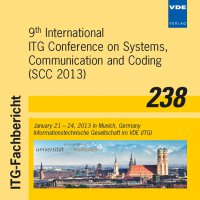PAPR of Variable-Gain and Fixed-Gain Amplify and Forward Relaying
Konferenz: SCC 2013 - 9th International ITG Conference on Systems, Communication and Coding
21.01.2013 - 24.01.2013 in München, Deutschland
Tagungsband: SCC 2013
Seiten: 5Sprache: EnglischTyp: PDF
Persönliche VDE-Mitglieder erhalten auf diesen Artikel 10% Rabatt
Autoren:
Michalopoulos, Diomidis S. (Department of Electrical and Computer Engineering, University of British Columbia, Vancouver, Canada)
Hadzi-Velkov, Zoran (Faculty of Electrical Engineering and Information Technologies, Ss. Cyril and Methodius University, Skopje, Macedonia)
Karagiannidis, George K. (Department of Electrical and Computer Engineering, Aristotle University of Thessaloniki, Thessaloniki, Greece)
Schober, Robert (Friedrich-Alexander-Universität Erlangen-Nürnberg, Germany)
Inhalt:
Most works on amplify and forward (AF) relaying assume that the relay obtains perfect channel state information (CSI) of the source-relay channel. This renders variable-gain relaying (VGR) an attractive technique, as the relay can ideally invert the channel at its input and thus ensure constant output power. What happens to the output power, however, if the CSI at the input is outdated? As an attempt to answer this question, we introduce a study of AF relaying under a novel perspective. This involves the use of the well-known peak-to-average-powerratio (PAPR) for capturing the negative effects of imperfect channel inversion at the relay. The imperfect channel inversion, caused by imperfect CSI at the relay, results in using the power amplifier in its non-linear region, which induces signal distortion. In this regard, expressions for the complementary cumulative distribution function (CCDF) of the PAPR at the relay’s output are derived. The analysis involves VGR with outdated CSI at its input, as well as its simpler counterpart which uses only statistical CSI, namely fixed-gain relaying (FGR). Our results manifest that there exists a threshold on the reliability of the CSI at the relay, below which VGR looses its advantage over FGR in being more efficient in terms of the potential signal distortion at the relay, caused by amplification in the non-linear region.


